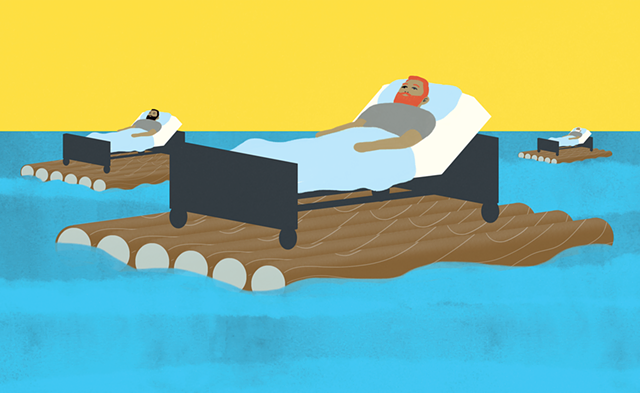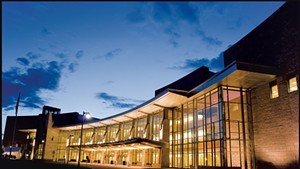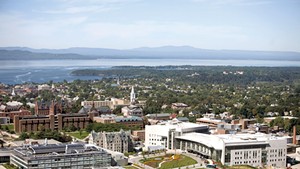
- Thomas James
The project has been in the works since 2018, when state regulators ordered the University of Vermont Health Network to use more than $20 million in budget surplus to open more mental health beds.
The network responded with an ambitious plan to replace 15 existing beds at the Central Vermont Medical Center with a 40-bed unit that would offer single-occupancy rooms inside of a new four-story building connected to the Berlin hospital.
But four years later, network leaders say they don't have enough money to run the new unit, let alone build it. The project, which the network had hoped to open by 2025, is now estimated to cost just shy of $160 million — a price tag that also includes necessary upgrades to the emergency department.
“We can't responsibly carry forward the project at this time,” University of Vermont Health Network CEO and president John Brumsted told regulators on Wednesday.
Members of the Green Mountain Care Board were deeply disappointed but said they recognized the network was in a tough spot. They urged Brumsted to work with them on a way to save the project.
“I understand completely the decision to pull the plug at this point in time, given the financial pressures that you're under,” said board member Jessica Holmes. “My brain is already trying to problem solve.”
The news couldn't come at a worse time for Vermont's long-overburdened mental health care system.
Staffing shortages at Vermont's existing inpatient facilities have taken dozens of the state's 200 adult psychiatric beds offline in recent months, while the pandemic has only intensified the need.
Hospitals say more psychiatric patients are seeking emergency care than ever before. With few vacant beds around the state, many of these people end up spending days, if not weeks, stuck in emergency rooms, where they often can't get the treatment they need.
Officials had long hoped the Berlin project would help alleviate these pressures. "It's deeply troubling, the state that we're in," Holmes said.
Related Denied a 10 Percent Rate Hike, UVM Health Network Warns of Service Cuts

Denied a 10 Percent Rate Hike, UVM Health Network Warns of Service Cuts
Health Care
UVM officials blamed the losses on rising labor and inflation costs, and asked the Green Mountain Care Board for permission to hike their rates 10 percent on top of the 6 percent increase it already received this year — a move the network said would cover about two-thirds of the deficit.
But facing pressure from businesses and insurers to deny the request, the care board slashed the increase to about 2.5 percent. The health network issued a statement in response that said it was reassessing the psychiatric project’s “financial viability.”
Brumsted said Wednesday that the network would have suspended the plan even if it received the full rate request.
The hospital group has been tapping into its reserves to make up for shrinking margins in recent years and “couldn't possibly generate the capital to cover all of those costs,” he said.
The network would also need to absorb the ongoing expense of simply running the unit. Insurers reimburse the Berlin hospital only about 37 percent of what it costs to run the existing 15 beds there, resulting in an annual loss of about $4.5 million. Add another 25 beds into the mix and the network would lose an additional $25 million annually, Brumsted said.
Brumsted didn’t close the door completely. Instead, he laid out three criterion that would need to be met. First, insurers — including the state-run Medicaid program — would need to agree to pay rates high enough for the hospital to break even on the unit. Second, the network would need to be able to find another $80 million or so in capital costs.
Related Telemedicine Is Helping Some Vermont Hospitals Manage a Growing Number of Psychiatric Patients

Telemedicine Is Helping Some Vermont Hospitals Manage a Growing Number of Psychiatric Patients
Health Care
Regulators haven’t decided what will happen to UVM’s years-old budget surplus now. The network spent a little over $2 million on the planning process, meaning there’s about $18 million still around. The board could direct the hospital to spend the money elsewhere, or it could offer it to another hospital for the same purpose, though it’s unclear whether any could accommodate new inpatient psych beds.
For now, regulators seemed content with the network keeping the money while they consider ways to keep the project alive. Among the ideas floated at Wednesday's meeting: ask other hospitals to pitch in, or get the state to cover the cost.
“I don’t think your request is unreasonable,” board chair Kevin Mullin told Brumsted. “You can’t lose additional money. I’m just trying to figure out what would make this project viable."














Comments
Comments are closed.
From 2014-2020, Seven Days allowed readers to comment on all stories posted on our website. While we've appreciated the suggestions and insights, right now Seven Days is prioritizing our core mission — producing high-quality, responsible local journalism — over moderating online debates between readers.
To criticize, correct or praise our reporting, please send us a letter to the editor or send us a tip. We’ll check it out and report the results.
Online comments may return when we have better tech tools for managing them. Thanks for reading.